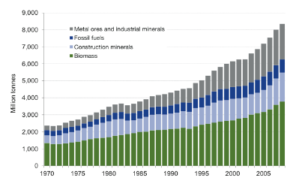
By Joan Martinez-Alier, F. Demaria, Leah Temper, M. Walter
Abstract
Firstly, we present some environmental conflicts gathered in 2016 in the EJAtlas, selecting a few that have implied deaths of environmental defenders around the world including India and South America. Such conflicts arise from changing trends in the social metabolism. Secondly, we compare India and South America in terms of internal metabolism and international trade. We show that South America and India are at different moments in the race (concomitant with increased GDP per person) for the use of materials. South America reached a level of extraction of over 10 tons per person/year of all materials. It is unlikely that this will increase much. Maintaining this level already means environmental pressures. A substantial part goes for exports, much larger than the imports. In contrast, India was until recently at a level not much above 5 tons of material use per capita/year. If the Indian economy grows, as it is likely to do, the social metabolism will increase in volume more or less in proportion to economic growth. The use of biomass will increase much less than that of building materials and fossil fuels. This follows the regular patterns of economic growth. Internally, the Indian economy exploits some states as providers of raw materials in a pattern of ecological internal colonialism but internationally (in terms of material flows), it is not subject to ‘ecologically unequal exchange’, contrary to South America. Finally, we use some statistics from the EJAtlas comparing participation of indigenous and traditional populations and rates of ‘success’ in local struggles for environmental justice in both subcontinents, to see whether the global movement for environmental justice can help to slow down the destruction of the environment and local livelihoods and cultures.
Link
https://journals.uair.arizona.edu/index.php/JPE/article/view/20252
Keywords
EJAtlas
material flows
economic growth
ecological distribution conflicts
environmental defenders
ecologically unequal trade
internal colonialism
Acknowledgements
EJOLT FP7 project (2011-15) and EnvJustice (Advanced Grant from the European Research Council awarded to Joan Martinez-Alier). The authors are grateful to Grettel Navas and Brototi Roy for help.
This is the ninth article in Alf Hornborg and Joan Martinez-Alier (eds.) 2016. “Ecologically unequal exchange and ecological debt”, Special Section of the Journal of Political Ecology 23:328-491:

The project ENVJUSTICE has received funding from the European Research Council (ERC) under the European Union’s Horizon 2020 research and innovation programme (grant agreement No. 695446)